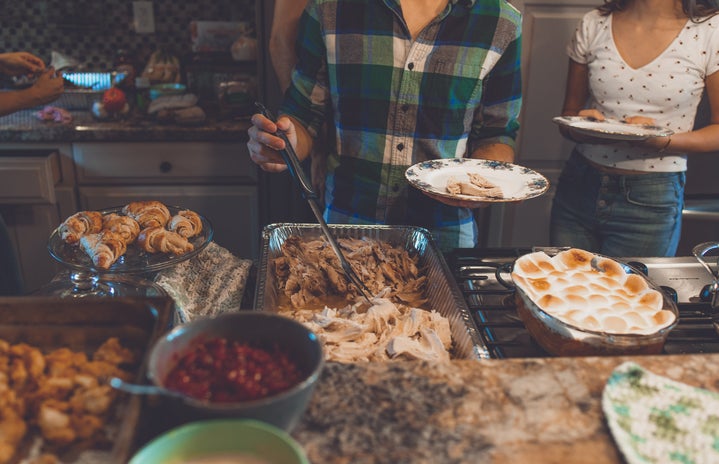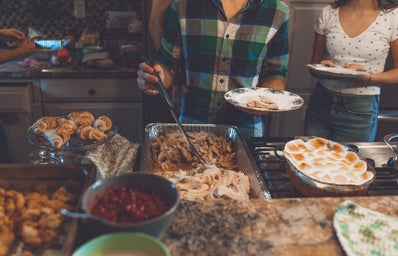As we make our way into November, we are getting closer and closer to the holiday season (and breaks woo hoo!) Besides getting to spend time with family and friends, one of the highlights of the holiday season for me is the cozy food. While holiday meals are often a source of joy as they bring families and traditions together, they can also bring with them social pressures and expectations about what to eat, when to eat it, and how much exercise to do afterwards to work it off.
These social pressures and expectations can come from family, friends, and even from yourself, and may look like any of the following:
- “You’ve really put on a lot of weight this semester. Do you really need a second helping?”
- “You’re looking too thin, eat some more!”
- “You look so good, how much weight have you lost? Congratulations!”
- “You’re not gonna try my dish? I made it just for you and it took me hours. Eat some!”
- “I’m gonna have to go on a carb detox for the next week to lose all this weight I gained over the holidays.”
- “I can only have dessert if I workout for an extra hour tomorrow.”
- “Don’t leave food on your plate! You should be grateful to have this food to eat.”
- “I haven’t eaten all day so I can pig out at dinner. I didn’t eat yesterday either.”
- “I try to stay away from carbs.”
- “Don’t eat pie for breakfast! You had enough yesterday.”
- “UGH! I gained two pounds from that meal yesterday.”
- “What diet are you gonna go on after New Years? We gotta work this holiday food off somehow. Wanna try KETO with me?”

While these statements may seem normal and commonplace, they are actually rooted in socially constructed rules about how, when, and how much a person is expected to eat –or not eat– that often go unquestioned. These statements can take a toll not only on one’s relationship with food but also on their body image and overall mental health. In the research I conducted on campus last semester about Denison students and the way diet culture affected their choices surrounding eating, I found that Denison students typically are not following explicit diets yet often follow their own “little rules” and receive social pressure, just like in the statements above, to engage in certain eating behaviors that perpetuate diet culture. Thank goodness I also found that despite these misconceptions and social pressures, Denison students were still able to find ways to listen to their bodies and eat the foods that make them feel good.
Therefore, to build upon the intuitive eating you are already doing while also challenging some of the misconceptions and social pressures around food that often go unquestioned, here are some statements to practice saying before your next holiday meal:
- “What foods sound good to me right now?” — The number one thing you need to ask yourself –during the holidays and everyday– is what food sounds good to both your body and your tastebuds. What sensations do you want to feel? Warm and cozy? Light and refreshed? Do you want crunchy or smooth? Sweet or savory? Hot or cold? A big helping or a small one? Put on your plate the foods that sound yummy to you and that you think will satisfy your appetite. While this can be hard with both external and internalized pressures surrounding food, it is a simple first step in choosing the foods that will make you feel good.
- “No.” — Whether it’s your grandparent asking you to eat a second slice of their pie they spent hours making, your parent telling you to finish the food on your plate, or your friend encouraging you to go on a new diet with them after the holidays, you have the power and the right to say ‘no.’ It is not your responsibility to make others happy by eating their food, finishing your plate, or joining them on the next fad diet. You have the right to be in control of what foods go into your body and it is okay to say ‘no,’ no matter who is asking or how many times they ask.
- “I want seconds! I can eat whatever I want whenever I want it.” — You also have the right to say yes and eat more food when you want it. Restricting your food intake is a vicious cycle where deprivation leads to cravings which leads to overeating which leads to guilt which leads to dieting which leads to deprivation and so on and so forth. Remind yourself that you have unconditional permission to eat whatever you want whenever you want it. It is okay to eat more food than the person sitting next to you. It is okay to get seconds.
- “There are no ‘good’ or ‘bad’ foods.” — Including holiday dishes, there are no foods that are “good” that you should be eating and there are no foods that are “bad” that you should avoid. Food is a neutral object and all of it –yes, all of it– provides some sort of nutrients or energy to our bodies that we need to survive. The moment you assign a food as “bad,” you immediately feel guilty for eating it, may deprive yourself of that food, and enter the vicious cycle of dieting. If you view food as neutral, you are allowing yourself the freedom to eat the foods that will actually satisfy you.
- “I have stomach hunger but I also have soul hunger.” — Eating is mostly about your stomach, yes, but food also brings joy and warmth to your heart and soul. We have to eat to satisfy ourselves not only physically, but also emotionally. Feel free to savor holiday dishes you wouldn’t normally have access to if you are in the mood to eat them.
- “I will not weigh myself, count calories, restrict food, or limit my portions this holiday season.” – While it may seem like normal behavior, weighing yourself and restricting your food can only ever lead to negative long-term emotions and should be avoided at all costs. Ditch the scale and the food tracking apps, like, right now.
- “I will not starve myself in order to eat a holiday meal.” — Remember that it is so important to fuel your body throughout the day rather than starving yourself so you can eat more of the holiday meal. If you are ravenously hungry when you sit down to eat, you will only be able to focus on eating large amounts of food very quickly to satisfy that hunger and won’t be able to enjoy the tastes and sensations of eating that food. Yes, you do want to be hungry when you sit down at the table so you can eat the meal, but being so hungry that you can’t do anything but eat takes away from enjoying the delicious food and time spent with family.
- “I am grateful for this food and I am giving myself grace.” — Even if you follow all these tips, you may still overeat and feel uncomfortable or leave the table feeling unsatisfied. That’s okay! Cut yourself some slack, especially if this is your first time trying to eat intuitively. It’s a hard process; it takes a while to become in tune with your body and become confident in making choices about food that serve your best interest. Even those people who have been practicing Intuitive Eating for years still have days where they leave the table feeling uncomfortable or unsatisfied; these are opportunities for learning! No one can be in perfect harmony with their body all the time so don’t beat yourself up for not eating to your expectations. Be proud that you tried to listen to your body and promise to continue to do so in the future. It only gets easier.

Before I leave you, I do want to recognize that being able to have a holiday meal spent with family and friends is a privilege not afforded to all due to lack of financial resources, distance from family, limited access to desirable foods, experiencing an eating disorder or going through eating disorder recovery, and many other extraneous circumstances. Eating intuitively a practice that I hope will become more accessible to all, but in the meantime here are some resources at Denison that are free for you to utilize in hopes of making it easier:
- Food Pantry – Higley Basement 014, Mondays and Wednesdays from 4:30-6:30pm
- Wellness Center Mental Health Counseling – (740)587-6200
Without further ado, let’s eat!
Sources:
- Intuitive Eating: A Revolutionary Anti-Diet Approach by Evelyn Tribole and Elyse Resch
- “Intuitive Eater’s Holiday Bill of Rights” by Evelyn Tribole
- “Intuitive Eating Practices During the Holidays” by the Center for Discovery
- “Intuitive Eating My Thanksgiving Meal” by Victoria Garrick (video)
- “Intuitive Eating on Thanksgiving & How to Navigate Navigate Food Around the Holidays with Nutrition Therapist Elyse Resch” by Victoria Garrick, Real Pod (podcast)

